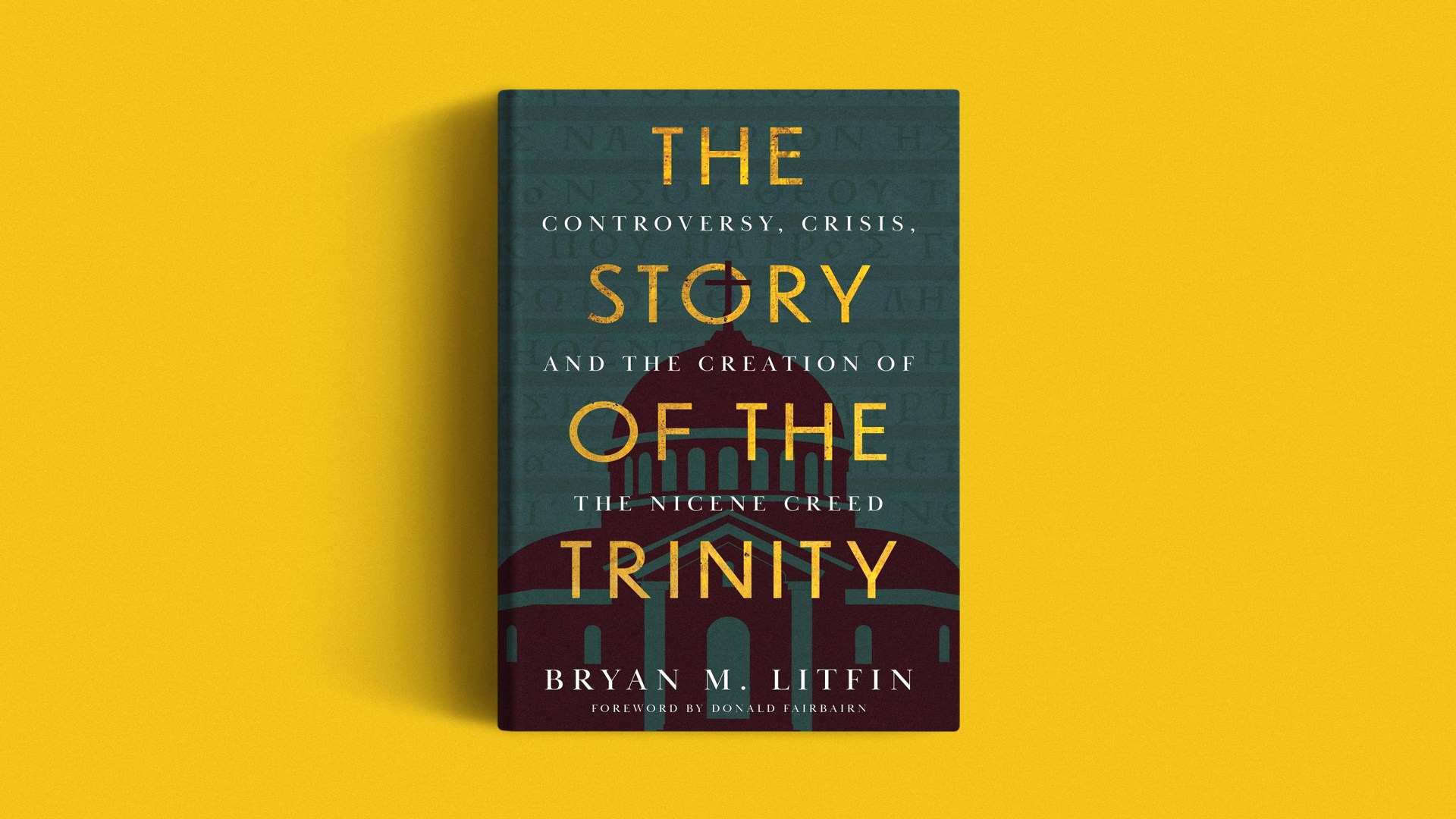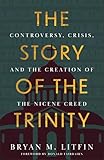Christians aren’t trying to speak in code, but sometimes we can sound like it.
The Story of the Trinity: Controversy, Crisis, and the Creation of the Nicene Creed
Baker Books
192 pages
Consider, for instance, the simple matter of the year 2025 being the 1700th anniversary of the Council of Nicaea in 325. Plenty of churches, schools, conferences, and magazines are celebrating by giving special attention to the Nicene Creed this year. Why not? It’s a round-numbered, landmark year and a great way to celebrate.
But if an interested observer happens to ask whether the Nicene Creed comes from the 325 Council of Nicaea, we have some explaining to do. Actually, the creed produced that year was different and shorter. But it’s symbolically important because it started the movement toward the better-known creed recited in churches across the world to this day. (Technically, it’s called the Nicaeno-Constantinopolitan Creed.)
That might sound like misdirection or double talk, but it isn’t. The year 325 and the “Nicene” creed written 56 years later really do belong together, and it all makes good sense, as long as you know the story that goes along with it. And by “story,” I mean a little bit of history and a little bit of theology.
In The Story of the Trinity: Controversy, Crisis, and the Creation of the Nicene Creed, Bryan Litfin cracks the code, leaps the language barrier, and delivers that history and theology. Litfin is a professor at Liberty University’s Rawlings School of Divinity, having previously taught for many years at Moody Bible Institute. Some time ago he began developing an engaging and accessible writing style, which he uses to great effect in this book about Nicaea.
The Story of the Trinity is under 200 pages long and is available in paperback for less than $20, which makes it the kind of nonintimidating object you might actually hand to a friend. But above all, you might recommend the book because of its high readability quotient.
Litfin’s authorial approachability starts with little courtesies, like showing how to pronounce a few hard words, explaining where key terms originated, and gamely admitting that paternity and filiation are “fancy words for fatherhood and sonship.”
His approachability extends to offering analogies for ancient geopolitical tensions in the church. For example, leaders in Roman Palestine and Syria may have defended Arius, who opposed the Nicene position on the Trinity, partly out of rivalry with metropolitan Alexandria. As Litfin writes, this might be like “a pastor today getting kicked out of New York City for what appeared to be conservative ideas. If those elite New Yorkers didn’t like a certain set of doctrines, that might be just enough reason for conservative Christians of Atlanta or Dallas to adopt them with gusto.”
It’s a loose analogy, and it may misfire for some readers. But it serves the purpose of inviting a broad range of readers into an imaginable historical setting, something like our own.
But Litfin’s commitment to readability determines a lot more than just these isolated features. It determines the shape of his whole project. He actively invites the kind of questions ordinary people might ask about Nicaea and its role in formulating the doctrine of the Trinity. In some cases, he channels these questions into chapter titles: Chapter 4, for instance, asks, “Does Yahweh Have a Son?” Chapter 6 poses the question “Maybe Jesus Is the Father?”
Similar thought experiments and queries appear throughout the book. As a theologian, Litfin must know that some of these are bad questions, but as a teacher he recognizes them as starting points for developing a better understanding.
Behind these decisions lies Litfin’s broad and generous sense of the obligations borne by anyone attempting to explain Nicaea at the popular level. It simply won’t do to open the book with some version of “Our story begins in 317,” when controversy first erupted between Arius and Athanasius of Alexandria, the church father known for articulating and defending the doctrine of the Trinity. In fact, readers don’t really enter the fourth century until the book is more than half over.
Up until then, we have not been creeping through the history of Christian doctrine so much as laying deep foundations in biblical theology. We get seven sprightly chapters on Old Testament monotheism, New Testament Christology, and eventually a few major figures like Tertullian and Origen—both Africans, as Litfin points out in an aside. Many of the key players in the early story hail from northern Africa.
Why so much biblical theology? Litfin doesn’t belabor the point, but he has obviously decided that what is at stake in Nicene theology will be compelling only against the backdrop of what the Bible says about God and Christ. The Story of the Trinity is not quite evangelistic, but it won’t risk leaving the foundations of the faith unstated while hurrying on to church history.
In fact, it comes close to offering a straightforward, disarming invitation to the gospel:
Are you ready to begin? Don’t worry; this won’t be a dry theological discourse that’s way over your head. Instead, in a step-by-step fashion, we’ll see how God has gradually revealed himself as a community of persons who eternally love one another, and who pour out their infinite love on the human race. To know God is to be invited into a community of perfect harmony and everlasting life. Who could ask for anything better than that?
Litfin is similarly gentle and patient (“Don’t worry”) with readers who believe in Jesus but aren’t already persuaded about the importance of creeds. The first chapter makes the case. In ten breezy pages, it asks and answers the question “What Is a Creed?,” starting with confessions of faith found in Scripture itself. Eventually, believers find themselves wanting more explicit accounts of how two core confessions—“God is one” and “Jesus is Lord”—go together. Nicaea offers itself as an answer. If theology is faith seeking understanding, creeds are confession seeking coherence and comprehensiveness.
The Story of the Trinity is a sweet chariot that swings low for a general audience. Does it also carry us home to theological precision? Yes, all things considered, it reaches remarkably high. Litfin writes for a popular audience but remains resourceful and responsible. At numerous points he includes stories and details that show he is not simply retailing widely available reports but has done the primary reading himself. He tucks the accounts of early church historians Sozomen and Socrates Scholasticus demurely into the endnotes; he offers quotations from the Theodosian Code, a collection of Roman laws made by its Christian emperors, to show how Roman leaders received the outcome of Nicaea.
The highest art is to conceal artistry, but Litfin slips in some little giveaways that let seasoned scholars know what he knows. One particular issue serves as a litmus test for whether a history of the fourth century is naïvely ignorant or critically credible. That issue is related to rhetoric from Athanasius, who famously taught his readers to label all defections from Nicene orthodoxy as “Arianism,” in reference to his chief opponent. That label certainly points to an important theological distinction, but Athanasius imposed it for decades on teachers who never claimed it for themselves.
Litfin nods to the “Arianism” problem: “Though we’ll use the term in this book for simplicity’s sake, it isn’t a very accurate expression. As it turns out, Arius wasn’t a key player in the decades after the Nicene council condemned him. Not many people wanted to claim his legacy, so he gradually disappeared off the scene.” It’s hard to imagine a defter handling of a historical stumbling point. Litfin makes it look easy.
While The Story of the Trinity doesn’t include original research (since that would be inappropriate for an introduction), it does display independent judgment. Specialists will quibble and gripe; it’s what they do. I winced to see Litfin perpetuate the myth of different “Trinitarianisms” in the Greek East and the Latin West. It’s a hallucination of outdated textbooks, and I doubt Litfin really believes it; he doesn’t let it mangle his reports about the theology of Augustine and of the Cappadocian church fathers, who defended the one Christian doctrine of the Trinity in diverse ways.
But advanced students of Nicaea should keep a sense of perspective about such things. If people ask you for a good, readable first book—in fact an only book—on Nicaea, there is a kind of madness involved in handing them scholarly staples like Lewis Ayres’ Nicaea and its Legacy (2004) or Khaled Anatolios’s Retrieving Nicaea (2011). Why not just send them to find R. P. C. Hason’s thousand-page opus The Search for the Christian Doctrine of God (1988)? Why not tell them to learn Greek and Latin?
On the mean streets of modern life, I regret to inform you that the standard for knowledge about Nicaea has been set by serial fabulist Dan Brown. In the popular mind, the council was either an open democratic vote on whether Jesus is God (“What do you guys think?”) or an imperial power play by the Roman emperor Constantine. Apparently, people think the bishops gathered there invented the New Testament, colluding to suppress other testaments. I kid you not.
Into this present darkness Litfin has lobbed a lightweight light source, a highly readable introduction to Nicaea that helps Christians sound less like they’re talking in code. How great would it be if, when people thought about Nicaea, what came to mind was not The Da Vinci Code but the Theodosian Code? May it be. It is a great blessing to have at hand such a Bible-based, gospel-focused, basic introduction to the Nicene Creed and its theology.
Fred Sanders is professor of theology in the Torrey Honors College at Biola University. His books include The Deep Things of God: How the Trinity Changes Everything.

















